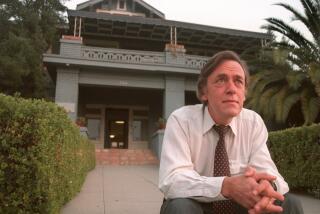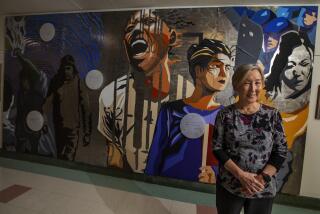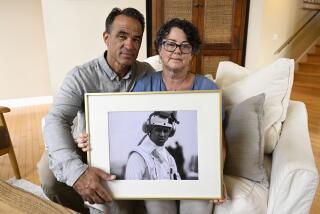Lane Hirabayashi, scholar who refused to let Japanese American prison camps be forgotten, dies at 67
Lane Hirabayashi, one of the nation’s leading scholars on the incarceration of Japanese Americans during World War II who spent decades trying to keep memories of the prison camps from being swept to the back pages of history, has died.
Hirabayashi died Aug. 8 in Santa Monica after a long struggle with cancer, his family said. He was 67.
The son of concentration camp survivors, Hirabayashi plowed through field notes from the camps, interviewed photographers tasked with making the forced confinements seem like a pleasurable experience to the rest of the U.S. and dove into the backstory of his own uncle, Gordon Hirabayashi, who was imprisoned when he protested the roundup of Japanese Americans after the 1941 attack on Pearl Harbor.
Gordon Hirabayashi’s legal fight reached the U.S. Supreme Court, and though the court ruled against him, his case was cited again and again as President Reagan signed the Civil Liberties Act of 1988, which blamed the wartime imprisonment of Japanese Americans on racial prejudice and failed political leadership.
“In the height of the hysteria, I think Gordon was very, very brave,” Lane Hirabayashi told The Times in 2006.
That year, Hirabayashi became the first professor in the nation to be named to an academic chair dedicated to the study of the incarceration camps and the wartime experience of Japanese Americans. It was a deeply personal appointment.
“To me, I feel that this is a family obligation,” he said during ceremonies when he was appointed to the George and Sakaye Aratani Endowed Chair in UCLA’s Asian American Studies Center.
In the months after the 9/11 terror attacks, the U.S. began requiring people from mostly Middle Eastern countries to register with the government, a reactive policy that to people such as the Aratanis — both incarceration camp survivors — seemed like worrisome evidence that the racial hysteria that gave birth to the World War II-era prison camps had been forgotten.
“A thing like that,” George Aratani said during Hirabayashi’s appointment, “should never happen again.”
An image of 2-year-old Yuki sitting on a suitcase at Union Station, waiting for a train to take her to the internment camp, resonated for decades.
Lane Ryo Hirabayashi was born Oct. 17, 1952, in Mill Valley, Calif., and grew up in a house of academics. His father, James, was the first dean of the College of Ethnic Studies at San Francisco State, and his uncle Gordon, whose education was interrupted by his imprisonment, was a professor at the University of Alberta in Canada. The family’s shared experience with incarceration was anything but a secret.
“In a lot of Japanese families there are still feelings of trauma or stigma, even today, and people don’t want to talk about it,” he told an American Friends Service Committee blogger in 2013. “But the camp was an episode in our extended family’s experience that was openly discussed.”
In the late 1960s, with the music scene thriving in San Francisco, he joined the Muskadine Blues Band, a rock group that shared the stage with musical acts such as Mike Bloomfield, Dan Hicks and His Hot Licks, and the Flying Circus. More comfortable with academics, Hirabayashi put aside his guitar and headed to Sonoma State, where he earned his bachelor’s degree. He earned his master’s and doctorate in anthropology at UC Berkeley.
Through his life, Hirabayashi blended academia and activism. While a professor at San Francisco State, he joined the fight to preserve housing for elderly Japanese immigrants during the redevelopment of San Francisco’s Japantown. He taught at the University of Colorado Boulder, UC Riverside and finally UCLA, all the while investigating a bygone era when more than 120,000 Japanese Americans were rounded up, stripped of most of their possessions and property, and taken against their will to prison camps encircled by barbed wire where armed guards stood watch.
Hirabayashi wrote books on the fieldwork conducted at incarceration camps such as Manzanar in the Owens Valley and Tule Lake in Northern California, and he documented and contextualized the government effort to photograph the prison camps and the arriving or departing inmates in as sunny a way as was possible.
In “A Principled Stand: The Story of Hirabayashi v. United States,” he shared his uncle’s diaries from his years of bruising legal fights with the government, including his arrest for violating a nightly curfew for Japanese Americans, his imprisonment for resisting being taken to a concentration camp and his profound disappointment when the U.S. Supreme Court ruled that his constitutional rights had not been violated.
In 1987, more than four decades later, Gordon Hirabayashi’s conviction was finally overturned.
As a scholar, Lane Hirabayashi pushed to eliminate government euphemisms such as “relocation” and “evacuation” and use honest terminology such as “imprisonment” and “mass arrests.”
“He wanted to change the narrative,” said Brian Niiya, a friend and a director with Densho, a grass-roots organization dedicated to preserving the story of the World War II-era incarceration. “In that, he was the leading figure.”
Hirabayashi is survived by his wife, Marilyn, his sister, Jan Rice, and several other relatives.
More to Read
Start your day right
Sign up for Essential California for the L.A. Times biggest news, features and recommendations in your inbox six days a week.
You may occasionally receive promotional content from the Los Angeles Times.







